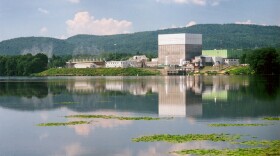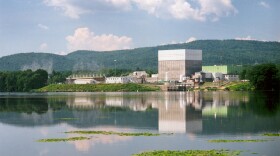The Waste Policy Committee of the Vermont Nuclear Decommissioning Citizen’s Advisory Panel is discussing legislation and policy proposals in Washington.
The committee has held a series of meetings to assess federal nuclear waste policies, proposed legislation and the implications for spent nuclear fuel at the former Vermont Yankee Nuclear Power Plant. Past meetings have reviewed the need for a U.S. spent nuclear fuel disposal site, transportation of materials and potential recycling and reprocessing of nuclear fuel.
Committee Chair Lissa Weinmann said this latest meeting was intended to discuss nuclear energy bills and policy proposals with representatives from the state’s Congressional delegation.
“Part of the mandate of this committee is to keep abreast of federal developments on nuclear waste policy and also to have a dialogue with our representatives so that they understand the work of the NDCAP (Nuclear Decommissioning Citizen’s Advisory Panel) and what we’ve recommended for instance to the Department of Energy and the kinds of thing we tackle here in this committee.”
Senator Bernie Sanders’ Climate Policy Advisor and energy and environment outreach team member Ethan Hinch says they are working on measures that would provide economic assistance for communities dealing with stranded nuclear waste and facility closures.
“This also relates to a bill the Senate is considering called the Advance Act which pushes the ball forward on building nuclear plants without addressing the stranded nuclear waste,” Hinch said. “One good part about this Advance Act is that it includes funding for economic assistance for nuclear plant closure communities. Senator Sanders did not support this bill when it went through the Environment and Public Works Committee because of the broader impact on nuclear energy in this country. But the Senator is excited to see this funding for economic assistance for nuclear closure communities.”
Juliet Walsh, Energy and Environment Policy Director in Senator Peter Welch’s office, says funding for nuclear waste disposal has been increased in recently released Senate and House budget adjustments.
“We have a little over $12 million that would be appropriated for nuclear waste disposal in this FY ’24 bill,” said Walsh. “That’s an increase from about $10 million in 2023. Also wanted to just flag for you all that there is no DOE (Department of Energy) rulemaking that we are aware of that’s open and active on spent nuclear fuel at this moment.”
On February 28th the House passed the Atomic Energy Advancement Act on a 365 to 36 vote. Congresswoman Becca Balint was one of the no votes. Thomas Renner is a member of her Energy Policy staff.
"The Congresswoman did vote against that due to the lack of provisions regarding safety and siting for spent nuclear fuel,” said Renner. “The Congresswoman also sits on the Spent Nuclear Fuel Solutions Caucus and we’re thinking that the caucus will be meeting on March 20th with the Department of Energy’s Deputy Assistant Secretary for Spent Fuel and Waste Disposition about FY ’25 appropriations funding. That caucus has sent a number of letters to OMB (Office of Management and Budget) and the Department of Energy around nuclear waste. So they’re expected to get active again after March 20th."
Panel citizen appointee David Eastman asked Hinch about the difficulty in finding a permanent storage site for spent nuclear fuel.
"Waste was a big issue 50 years ago and here we are 50 years later still talking about it,” noted Eastman. “Are we still where we technically don’t know the solution? Is it financial, that we don’t want to pay for it?”
“A really big factor is that it’s really, really, really difficult to find a location where you can store anything for 100,000 years,” replied Hinch.” And certainly part of resolving those issues is a lack of funding.”






